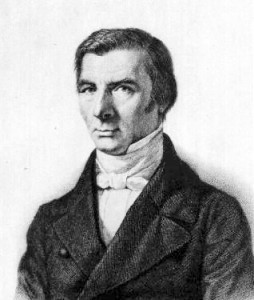Has Romney read Bastiat?
**Posted by Phineas

Republican nominee-in-waiting Mitt Romney spoke recently at a meeting of the National Rifle Association in St. Louis, where he gave a powerful speech attacking the Obama administration’s insults to our economic liberty. IBD’s Andrew Malcolm posted excerpts from the speech (and the whole thing), and I recommend reading it.
One part in particular jumped out at me, however, wherein Romney explains the hidden costs of Obama’s tax-and-regulate binge:
“The real cost isn’t just the taxes paid and money spent complying with the rules. It’s the businesses that are never started, the ideas that are never pursued, the dreams that are never realized.”
That could come straight from the thinking of Frederic Bastiat, a 19th century French (1) classical liberal and economist. In his essay “That which is seen, and that which is not seen,” Bastiat attacked the idea that government spending could create wealth, arguing instead that such spending, while it would pump money into the economy, came at the expense of the citizen’s ability to spend that same money on those things that would improve his life. To illustrate his point, he used the parable of the broken window:
Suppose it cost six francs to repair the damage, and you say that the accident brings six francs to the glazier’s trade – that it encourages that trade to the amount of six francs – I grant it; I have not a word to say against it; you reason justly. The glazier comes, performs his task, receives his six francs, rubs his hands, and, in his heart, blesses the careless child. All this is that which is seen.
But if, on the other hand, you come to the conclusion, as is too often the case, that it is a good thing to break windows, that it causes money to circulate, and that the encouragement of industry in general will be the result of it, you will oblige me to call out, “Stop there! your theory is confined to that which is seen; it takes no account of that which is not seen.”
It is not seen that as our shopkeeper has spent six francs upon one thing, he cannot spend them upon another. It is not seen that if he had not had a window to replace, he would, perhaps, have replaced his old shoes, or added another book to his library. In short, he would have employed his six francs in some way, which this accident has prevented.
Let us take a view of industry in general, as affected by this circumstance. The window being broken, the glazier’s trade is encouraged to the amount of six francs; this is that which is seen. If the window had not been broken, the shoemaker’s trade (or some other) would have been encouraged to the amount of six francs; this is that which is not seen.
And if that which is not seen is taken into consideration, because it is a negative fact, as well as that which is seen, because it is a positive fact, it will be understood that neither industry in general, nor the sum total of national labour, is affected, whether windows are broken or not.
Now let us consider James B. himself. In the former supposition, that of the window being broken, he spends six francs, and has neither more nor less than he had before, the enjoyment of a window.
In the second, where we suppose the window not to have been broken, he would have spent six francs on shoes, and would have had at the same time the enjoyment of a pair of shoes and of a window.
In other words, no wealth was created. The glazier may be a bit richer, but the shopkeeper is poorer. (He may have his window, but he’s out six francs.) Worse, his economic liberty to make his life better was infringed, since the breaking of the window forced him to spend money only to put things back the way they were.
The quote from Romney’s NRA speech indicates he understands (2) what Bastiat was talking about: that government spending only moves wealth from one pocket to another (via taxation); that regulations are a form of taxation (through compliance costs); and that both entail hidden opportunity costs (those things we would like to do but now cannot) by restricting economic liberty.
A president who takes Bastiat to heart is far preferable to one who embraces Alinsky.
Footnotes:
(1) A Frenchman advocating limited government? How times have changed.
(2) Yeah, I know: “Romneycare.” Let’s hope he learned from that.
(Crossposted at Public Secrets)
